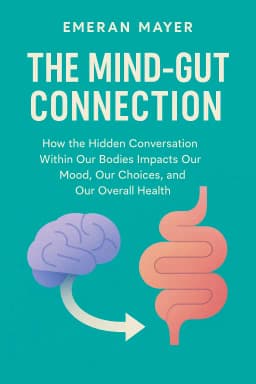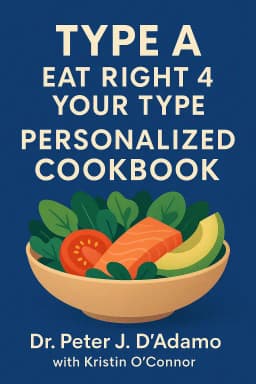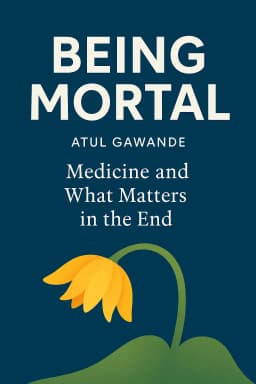
Your Gut is Your Second Brain
Golden Hook & Introduction
SECTION
Laura: Sophia, quick question. Where do you think happiness is made? Sophia: In the brain, obviously. Dopamine, serotonin, all that good stuff firing between neurons. It’s the command center for everything, right? Laura: That's what we all think. It feels intuitive. But what if I told you the vast majority—over 90%—of your body's serotonin, the so-called 'happiness molecule,' isn't in your head at all? It's in your gut. Sophia: Hold on. Ninety percent? That can't be right. You're telling me my stomach is responsible for my mood more than my brain is? That feels completely backwards. Where is this coming from? Laura: It’s the central, mind-bending idea in a book we're diving into today: The Mind-Gut Connection by Dr. Emeran Mayer. And what makes him so credible is his background. He's not just a distinguished research professor and gastroenterologist at UCLA; he's also a former documentary filmmaker. Sophia: Oh, that's an interesting combination. Laura: It is! It means he spent years studying ancient healing traditions, from the Amazon to Ayurvedic medicine, and saw that they all recognized this deep connection between our gut and our emotions. He saw it in practice long before Western science had the tools to prove it. The book is his journey to connect that ancient wisdom with cutting-edge neuroscience. Sophia: Wow, okay. So he’s bridging two worlds. I'm intrigued. My entire concept of the mind being the boss is already on shaky ground.
The Second Brain: Your Gut is Talking Back
SECTION
Laura: Exactly. And that's the first major shift the book asks us to make. We tend to think of the brain as a CEO, barking orders down to the rest of the body. But Dr. Mayer shows us that the gut is far from a passive subordinate. It has its own complex nervous system, so vast and intricate that scientists call it the "second brain." Sophia: Okay, "second brain" sounds like a cool metaphor. What does that actually mean in practice? Is it thinking for itself? Laura: In a way, yes. It's technically called the enteric nervous system, and it’s made of hundreds of millions of neurons—more than are in your spinal cord. This system is so sophisticated it can manage the entire complex process of digestion on its own, without any input from the brain in your head. It’s like it has its own local government. Sophia: That makes sense. So it’s running the day-to-day operations of the digestion department. But how does it talk to the head office? Laura: Through an incredible information superhighway called the vagus nerve. Think of it as a massive fiber-optic cable running directly from the brainstem to the abdomen. But here is the most stunning part, the detail that changes everything: about 80 to 90 percent of the nerve fibers in that cable are carrying information up from the gut to the brain. Sophia: Wait, you have to repeat that. The traffic is mostly going up? Laura: Precisely. The gut is constantly sending a flood of information to the brain. It’s reporting on everything: the nutrients you’ve eaten, the state of your immune cells, the chemical environment. Your gut is like a field agent, constantly sending intelligence reports back to headquarters. And the brain listens. Sophia: That’s wild. So my gut is shaping my perception of the world from the inside out. Can you give me an example of this in action? Laura: Absolutely. Dr. Mayer uses a great one: a marathon runner. Imagine Sarah, a 35-year-old amateur athlete, running the Boston Marathon. For the first half, her brain is in charge—pacing, strategy, positive self-talk. But halfway through, her body starts to face extreme stress. Her glycogen stores are depleting, her electrolytes are imbalanced. Sophia: I can feel the pain just thinking about it. Laura: And where do the first real distress signals come from? Her gut. She starts to feel nauseous, gets a side stitch, maybe muscle cramps. Those aren't just random pains. That is her second brain screaming up the vagus nerve: "EMERGENCY! We are low on fuel! We are overheating! We are approaching system failure!" Sophia: And her brain has to listen. It can't just power through with positive thinking. Laura: It can't. The signals from the gut are too powerful. They trigger feelings of profound fatigue, distress, and the overwhelming urge to stop. Sarah has to slow down, drink water, take in electrolytes. She is forced to obey the wisdom of her gut. Her body's intelligence, originating from the gut, overrode her conscious mind's plan. That’s the mind-gut connection in its most primal form. Sophia: Wow. So it’s not just about digestion. It’s a fundamental survival system. The gut knows the ground truth of our physical state, and it makes sure the brain gets the message, whether we like it or not.
Microbe-Speak and Gut Feelings
SECTION
Laura: Exactly. And that brings us to the next, even more mind-blowing layer of this. If the vagus nerve is the highway, we have to ask: who is writing these messages? Who is speaking the language? Sophia: I have a feeling it’s not the food itself sending emails to my brain. Laura: You're right. The secret translators, according to Dr. Mayer, are the trillions of microorganisms living in your gut—your microbiome. These bacteria, fungi, and viruses are not just passive passengers. They are a bustling, living ecosystem, a massive chemical factory inside you. Sophia: Okay, I've heard about the microbiome. It's a hot topic. But I thought it was mostly about breaking down fiber and things like that. Laura: It does that, but it does so much more. This is what Dr. Mayer calls "microbe-speak." These microbes digest the food you eat and, in the process, produce a vast array of chemicals. And some of these chemicals are neuroactive. They are the very same molecules our brain uses to regulate mood: serotonin, dopamine, GABA. Sophia: You're telling me that the bacteria in my gut are manufacturing mood-altering chemicals based on what I had for lunch? That sounds like science fiction. Laura: It's established science. They produce these neurotransmitters, which can then enter the bloodstream or, even more directly, stimulate the vagus nerve. They are essentially speaking a language the brain understands perfectly. A happy, well-fed microbiome sends calming, positive signals. A distressed, imbalanced microbiome sends signals of anxiety and inflammation. Sophia: Honestly, that's a little unsettling. The idea that these tiny non-human organisms are influencing my emotions feels like I'm being manipulated by an alien colony I swallowed. Laura: It’s a symbiotic relationship! And it gets even deeper. This biological reality is the foundation for something we talk about all the time but don't understand: gut feelings. Intuition. Sophia: Ah, yes. The classic "I have a bad feeling about this." I always thought that was just my brain's pattern-recognition software running in the background. Laura: Dr. Mayer argues it's much more embodied than that. He shares a powerful story, a classic in the field, about a firefighter chief. His team is inside a burning house, and the fire seems routine, under control. But the chief is suddenly overcome with an inexplicable sense of dread. A powerful gut feeling that something is terribly wrong. Sophia: But he can't see anything to justify it? Laura: Nothing. No visual cues, no sounds. But the feeling is so overwhelming that he orders his entire team to evacuate immediately. They think he's overreacting, but they obey. Moments after they get out, the entire floor collapses into the basement, which had been the hidden source of the fire. They would have all been killed. Sophia: Whoa. That gives me chills. So what was that? Laura: That was his gut-brain axis in action. His brain was subconsciously processing thousands of micro-cues—the way the smoke smelled, the temperature on his skin, subtle sounds—and integrating them with decades of experience. This rapid, holistic risk assessment didn't surface as a conscious thought. It manifested as a powerful, visceral sensation in his gut, a clear signal sent up the vagus nerve that screamed "DANGER!" He trusted it, and it saved his team. Sophia: So a gut feeling isn't just a metaphor. It's a biological alarm system. But I have to ask, because the book was praised for its scientific balance and not over-hyping things. How solid is all of this? Is it possible we're giving these microbes a little too much credit? Laura: That's a great question, and Dr. Mayer is very careful about this. He emphasizes that this is an emerging field. We can't say that a specific probiotic will cure depression. The system is far too complex for such simple fixes. The point he makes is that the connection is undeniable. The communication exists, and it is a powerful, often overlooked, factor in our mental and emotional lives. He's not offering miracle cures; he's revealing a hidden part of ourselves we need to start paying attention to.
Synthesis & Takeaways
SECTION
Sophia: That makes sense. It’s about acknowledging the conversation is happening, not necessarily having a perfect transcript of it yet. Given all this, what's the biggest thing we're doing in our modern lives to mess up this beautiful, intricate system? Laura: In a word: diet. Dr. Mayer has a chapter titled "The Onslaught of the North American Diet," and it's a brutal takedown. Our modern diet—high in processed foods, sugar, unhealthy fats, and low in fiber—is catastrophic for our microbiome. Sophia: How so? Laura: It's simple. The "good" microbes, the ones that produce the happy, anti-inflammatory chemicals, thrive on plant fiber. That's their food. When we don't eat enough fiber, we are literally starving our allies. Meanwhile, the "bad" microbes, the ones that promote inflammation and send stress signals to the brain, love sugar and processed fats. So our diet actively cultivates a hostile, anxious, and inflamed inner world. Sophia: So junk food literally creates bad vibes that travel directly to your brain. And healthy, fiber-rich food creates good vibes. It's that direct? Laura: It is that direct. This is why Dr. Mayer is a huge proponent of a Mediterranean-style diet. It's packed with a diverse range of plants, healthy fats, and fermented foods, which act like the perfect care package for your microbiome. It's not about a restrictive diet; it's about cultivating your inner garden. Sophia: I love that framing. It’s not about deprivation, it's about cultivation. So, as we wrap up, what’s the one big idea we should take away from The Mind-Gut Connection? Laura: I think it fundamentally reframes our understanding of mental health. It’s more than just 'you are what you eat.' The deeper truth is 'you feel what you eat.' For decades, we’ve treated the mind as this disembodied thing that could be fixed with thoughts alone. This book shows us that our mood, our resilience, and our sense of well-being are deeply rooted in our physical biology—in this ancient, profound conversation between our two brains. We've spent a century silencing our gut, and we are feeling the consequences in our minds. Sophia: That's incredibly powerful. It puts some of the control back in our hands, but in a totally different way. Okay, for someone listening who feels inspired but also overwhelmed, what is one simple, concrete first step they could take this week? Laura: Dr. Mayer would say don't overhaul your whole life overnight. Just make one small change. Add one new thing that your microbes will love. It could be a spoonful of kimchi or sauerkraut, a cup of yogurt, or just adding one more type of vegetable to your dinner. Just one small act of kindness to your inner garden. Sophia: I can do that. Cultivate the garden, don't just weed it. I love it. Laura: This is Aibrary, signing off.









